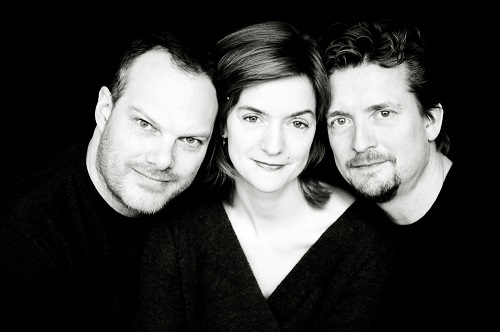 United States Mozart, Shostakovich, Dvořák: Tetzlaff-Tetzlaff-Vogt Trio (Christian Tetzlaff [violin], Tanja Tetzlaff [cello], Lafs Vogt [piano]), presented by San Francisco Performances, Herbst Hall, San Francisco, 27.4.2019. (HS)
United States Mozart, Shostakovich, Dvořák: Tetzlaff-Tetzlaff-Vogt Trio (Christian Tetzlaff [violin], Tanja Tetzlaff [cello], Lafs Vogt [piano]), presented by San Francisco Performances, Herbst Hall, San Francisco, 27.4.2019. (HS)

Mozart — Piano Trio in B flat major K.502
Shostakovich — Piano Trio No.2 in E minor Op.67
Dvořák— Piano Trio No.3 in F minor Op.65
Last month the violinist Christian Tetzlaff shed extra emotional light, when he brought his contemporary violin (fashioned after a Guadagnini) for a Mozart concerto with the San Francisco Symphony. Saturday evening in the cozy confines of Herbst Hall, he and his trio delivered a varied evening of Mozart, Shostakovich and Dvořák. It may not have plowed as much new interpretive ground as the concerto, but it left a rapt audience satisfied.
This group plays with confidence and poise, diving fearlessly into complex passages and buffing familiar piano trios to a gleaming finish. The brother-sister team of violinist Christian and cellist Tanja kept the pace moving and articulated with precision. Lars Vogt, a major-league piano soloist, wove supple phrasing into the mix.
Their strongest statement came with the Dvořák Piano Trio No.3, which concluded the concert. The trio found joy in the composer’s melodic and harmonic inventiveness, and balanced that with deftly placed rhythms. The music sprang to life with digital clarity.
The drama of the opening pages, with the piano interrupting the strings’ octave utterances with brisk flourishes from the piano, grabbed the audience by its lapels, gathering intensity as more complexity developed. With easier breathing in quieter, more lyrical sections, these contrasts felt inevitable.
The short scherzo danced gently, leading to a soulful cello solo that brought sighs to the Poco Adagio. The finale started off blithe and lyrical before gathering momentum for a rousing finish.
Mozart’s B-flat Trio (K.502) made for a graceful opener, with Vogt rendering the piano’s primary role with a lighthearted, beaming smile. Interactions with the strings felt easygoing and perfectly placed, making for a fine appetizer for the much weightier fare that followed.
Shostakovich’s Piano Trio No.2 in E minor brims with anguish and grief, leavened by his stunning moments of invention. This group seemed more intent focusing on beauty and energy, perhaps to contrast with the sections in which the composer goes for a nastier texture. Faster than usual tempos amped up the intensity but missed some of the work’s fascinating details.
Tanja executed the opening melody with care, articulated in eerily sweet high harmonics on her cello. Christian and Vogt in turn joined the canon each with a different take on the melody — Christian’s subdued, Vogt getting a tad more intensity from pushing the tempo ever so slightly. The transition to the rhythmic moderato was fine, the pace picked up. The first movement set the table nicely for what was to come.
The second movement Allegro con brio galloped at a gripping, breathless pace, even if details like the fast crescendos on single notes lost their sardonic edge, and the rapid-fire piano figures could have used a bit more bite. Vogt’s opening chords for the third movement Largo introduced a stony passacaglia, and with fine adjustments on dynamics and tone.
The finale whipped up another fast tempo that triggered a sense of excitement, despite thickening the textures. They never quite captured the sarcastic edge of the Klezmer-like dance elements, but in the concluding adagio, the brief recaputulation with material from the earlier movements left a suitably haunting impression.
In introducing the encore, Dvořák’s Dumka No.3 from the composer’s Piano Trio No.4, Christian Tetzlaff offered it as a touching tribute to victims of that morning’s terrorist attack on a synagogue in southern California, to ‘bring love back again’ with the universality of music. The hymn-like opening phrases floated serenely, spreading balm over the evening.
Harvey Steiman